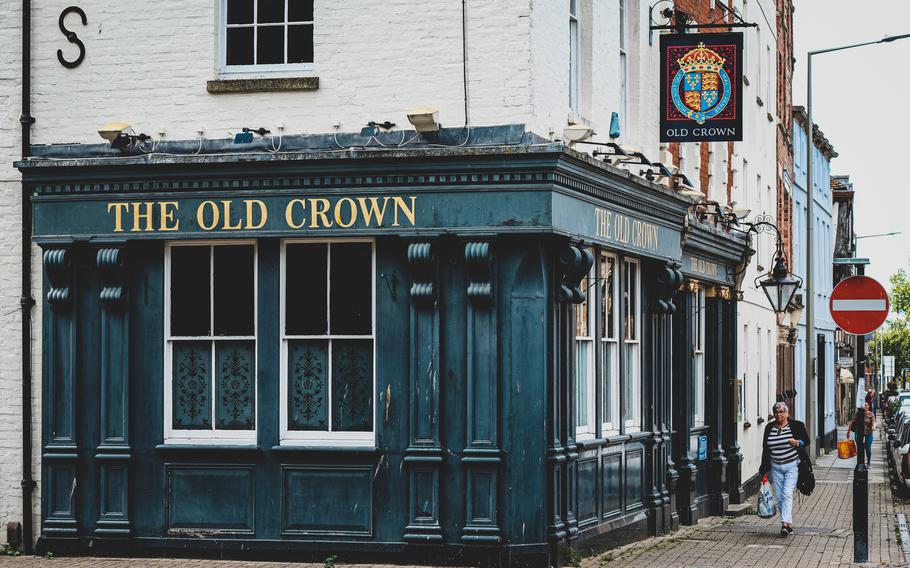-
English isn’t just English. British English and American English are very different. As an American, asking someone to check out my new pants seems harmless. In the U.K., asking someone what they think of your pants can be offensive (you’re essentially asking them to look at your underwear). Words and phrases have different meanings here. It’s definitely worth researching before your arrival.
-
Roundabouts will make sense eventually. Driving on the left is a harrowing experience, especially if you’ve never done it before. We were lucky enough to have been stationed in Okinawa, so driving on the left was like riding a bike for us. However, what constantly tripped us up in the beginning were the roundabouts. Often used instead of traffic lights to control intersections, there are plenty of rules and etiquette that go along with them. It can feel intimidating at first, especially when other drivers come flying around the corners, but you’ll get the hang of it. Just watch out when there are multiple unmarked lanes and semis or lorries.
-
The measuring system is unique. In mainland Europe (and the majority of the world), the metric system is king. In the U.S., we’re rebels who use the imperial system. The U.K. uses both. Signs on the road use yards and miles to mark the distance, but when you’re at the butcher or grocery store, you’ll need to order in grams or kilograms.
-
Know your geography. Prior to moving here, when people used “United Kingdom” and “Great Britain,” it was often assumed they were referring to England. That’s not the case. The United Kingdom is comprised of four nations or devolved governments: England, Scotland, Wales and Northern Ireland. The island of Great Britain is home to England, Scotland and Wales. The base we are assigned to is located in England, in Great Britain within the U.K.
-
“Sorry” isn’t necessarily an apology. The Britons are a very polite bunch. They use the word “sorry” a lot. However, it doesn’t always mean they’re apologizing for something. It can be used as a warning (pushing through a crowd), a conveyance of “I didn’t hear you; can you please repeat?,” acknowledging an embarrassing situation or forgetfulness, and pretty much any awkward predicament you can think of.
-
Queues are serious business. Don’t even think of jumping the queue. Ever. In Germany, you’ll get scolded for walking across the street before the crosswalk sign turns. In the U.K., you’ll have an angry mob harassing you if you cut in line. I’ve never done it but have witnessed the public shaming of someone who tried.
-
Sundays are awesome. Sundays in Germany are treated reverently. They’re used for family and rest. Shops are closed and it’s quiet. In the U.K., Sundays are chill and relax days. Shops are open limited hours (usually from 10 a.m. to 4 p.m.), roasts are enjoyed in the mid-late afternoon and it’s easy to just be. They’ve easily become one of my favorite days of the week since living here.
-
Plan your travel wisely. If you’re catching a train into London, you may want to check the football schedule. We’ve made the mistake of traveling into the city a few hours before and just after an Arsenal football match. Crowds of red-and-white clad fans crammed into the train carriages, with little breathing room. Likewise, National Rail will often perform track maintenance last-minute over the weekend, which can double your transit time.
-
Travel is more expensive. Even before Brexit, flying to mainland Europe (or really anywhere for that matter) was significantly more expensive. There are budget airlines such as Ryan Air, Easy Jet and TUI, but remember you get what you pay for. Also, if your children are in the British school system, you may not be able to pull them out of school over American holidays. You could be subjected to a hefty fine or other penalties.
-
Contactless is king. I remember being surprised at how often I needed to use cash in Germany. In the U.K., tapping your card or using contactless payments are the way to pay. Some American banks don’t offer contactless cards; however, it’s worth it to download apps such as Apple Pay, Google Pay or Samsung Pay. It makes transactions much easier, and you’ll blend in better without having to sign the receipt.
